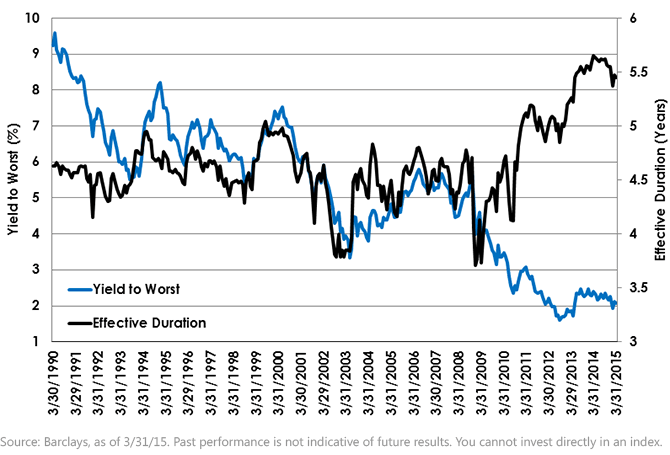Unconstrained ≠ Undisciplined Bond Investing


 For definitions of terms in the chart, visit our glossary.
Growing Headwinds for Core Fixed Income
As the Federal Reserve (Fed) looks to lift rates for the first time in nearly a decade, we believe that interest rate risk is likely to serve as a headwind rather than a tailwind going forward. In this investment environment, investors should ask themselves if the Agg’s current composition is reflective of their investment goals. As government issuance has risen in the United States, will this subset of the market offer compelling opportunities for income given the current interest rate environment? Put simply, an index is a reflection of issuance, not value.
What to Do?
With greater risks and lower income potential, traditional fixed income investors will need to accept either lower returns or greater volatility. In a worst-case scenario, they could experience both.
Unconstrained approaches are designed to address this challenge. Unconstrained strategies focused on delivering bond-like volatility can be used as either a complement or a replacement for core-based fixed income strategies. Given the increased flexibility for positioning and managing interest rate risk, unconstrained exchange-traded funds (ETFs) are, in our view, one potential solution to the uncertain environment.
Partnering with Western Asset Management Company to Offer an Unconstrained ETF
WisdomTree believes unconstrained fixed income strategies can also serve as core bond allocations. While there is a plethora of traditional fixed income-oriented benchmark ETFs, WisdomTree saw limited ETF solutions and a growing need.
To marry the benefits of the ETF structure—which includes full transparency into holdings of the unconstrained investment manager and the tax efficiency of the ETF structure—WisdomTree partnered with one of the leading fixed income managers in the world to offer an unconstrained ETF.
On June 11, WisdomTree launched the WisdomTree Western Asset Unconstrained Bond Fund (UBND). In an upcoming blog post, we will go into more detail on Western Asset’s approach to unconstrained investing and how it will be implemented in UBND. Quite simply, WisdomTree believes UBND can serve as a core fixed income allocation given Western Asset’s focus on delivering bond-like volatility with its unconstrained yet very disciplined focus on fixed income.
1Source: Barclays, as of 3/31/15.
For definitions of terms in the chart, visit our glossary.
Growing Headwinds for Core Fixed Income
As the Federal Reserve (Fed) looks to lift rates for the first time in nearly a decade, we believe that interest rate risk is likely to serve as a headwind rather than a tailwind going forward. In this investment environment, investors should ask themselves if the Agg’s current composition is reflective of their investment goals. As government issuance has risen in the United States, will this subset of the market offer compelling opportunities for income given the current interest rate environment? Put simply, an index is a reflection of issuance, not value.
What to Do?
With greater risks and lower income potential, traditional fixed income investors will need to accept either lower returns or greater volatility. In a worst-case scenario, they could experience both.
Unconstrained approaches are designed to address this challenge. Unconstrained strategies focused on delivering bond-like volatility can be used as either a complement or a replacement for core-based fixed income strategies. Given the increased flexibility for positioning and managing interest rate risk, unconstrained exchange-traded funds (ETFs) are, in our view, one potential solution to the uncertain environment.
Partnering with Western Asset Management Company to Offer an Unconstrained ETF
WisdomTree believes unconstrained fixed income strategies can also serve as core bond allocations. While there is a plethora of traditional fixed income-oriented benchmark ETFs, WisdomTree saw limited ETF solutions and a growing need.
To marry the benefits of the ETF structure—which includes full transparency into holdings of the unconstrained investment manager and the tax efficiency of the ETF structure—WisdomTree partnered with one of the leading fixed income managers in the world to offer an unconstrained ETF.
On June 11, WisdomTree launched the WisdomTree Western Asset Unconstrained Bond Fund (UBND). In an upcoming blog post, we will go into more detail on Western Asset’s approach to unconstrained investing and how it will be implemented in UBND. Quite simply, WisdomTree believes UBND can serve as a core fixed income allocation given Western Asset’s focus on delivering bond-like volatility with its unconstrained yet very disciplined focus on fixed income.
1Source: Barclays, as of 3/31/15.
Important Risks Related to this Article
UBND is new and has limited operating history. There are risks associated with investing, including possible loss of principal. Unlike typical exchange-traded funds, there is no index that the Fund attempts to track or replicate. Thus, the ability of the Fund to achieve its objective will depend on the effectiveness of the portfolio manager. Fixed income investments are subject to interest rate risk; their value will normally decline as interest rates rise. In addition, when interest rates fall, income may decline. Fixed income investments are also subject to credit risk, the risk that the issuer of a bond will fail to pay interest and principal in a timely manner or that negative perceptions of the issuer’s ability to make such payments will cause the price of that bond to decline. High-yield or “junk” bonds have lower credit ratings and involve a greater risk to principal. Foreign investing involves special risks, such as risk of loss from currency fluctuation or political or economic uncertainty. Investments in emerging, offshore or frontier markets are generally less liquid and less efficient than investments in developed markets and are subject to additional risks, such as risks of adverse governmental regulation and intervention or political developments. Derivative investments can be volatile, and these investments may be less liquid than other securities, and more sensitive to the effects of varied economic conditions. The Fund may engage in “short sale” transactions where losses may be exaggerated, potentially losing more money than the actual cost of the investment, and the third party to the short sale may fail to honor its contract terms, causing a loss to the Fund. Due to the investment strategy of this Fund, it may make higher capital gain distributions than other ETFs. Please read the Fund’s prospectus for specific details regarding the Fund’s risk profile. Foreside Fund Services, LLC. is not affiliated with Western Asset Management Company.

Rick Harper serves as the Chief Investment Officer, Fixed Income and Model Portfolios at WisdomTree Asset Management, where he oversees the firm’s suite of fixed income and currency exchange-traded funds. He is also a voting member of the WisdomTree Model Portfolio Investment Committee and takes a leading role in the management and oversight of the fixed income model allocations. He plays an active role in risk management and oversight within the firm.
Rick has over 29 years investment experience in strategy and portfolio management positions at prominent investment firms. Prior to joining WisdomTree in 2007, Rick held senior level strategist roles with RBC Dain Rauscher, Bank One Capital Markets, ETF Advisors, and Nuveen Investments. At ETF Advisors, he was the portfolio manager and developer of some of the first fixed income exchange-traded funds. His research has been featured in leading periodicals including the Journal of Portfolio Management and the Journal of Indexes. He graduated from Emory University and earned his MBA at Indiana University.

